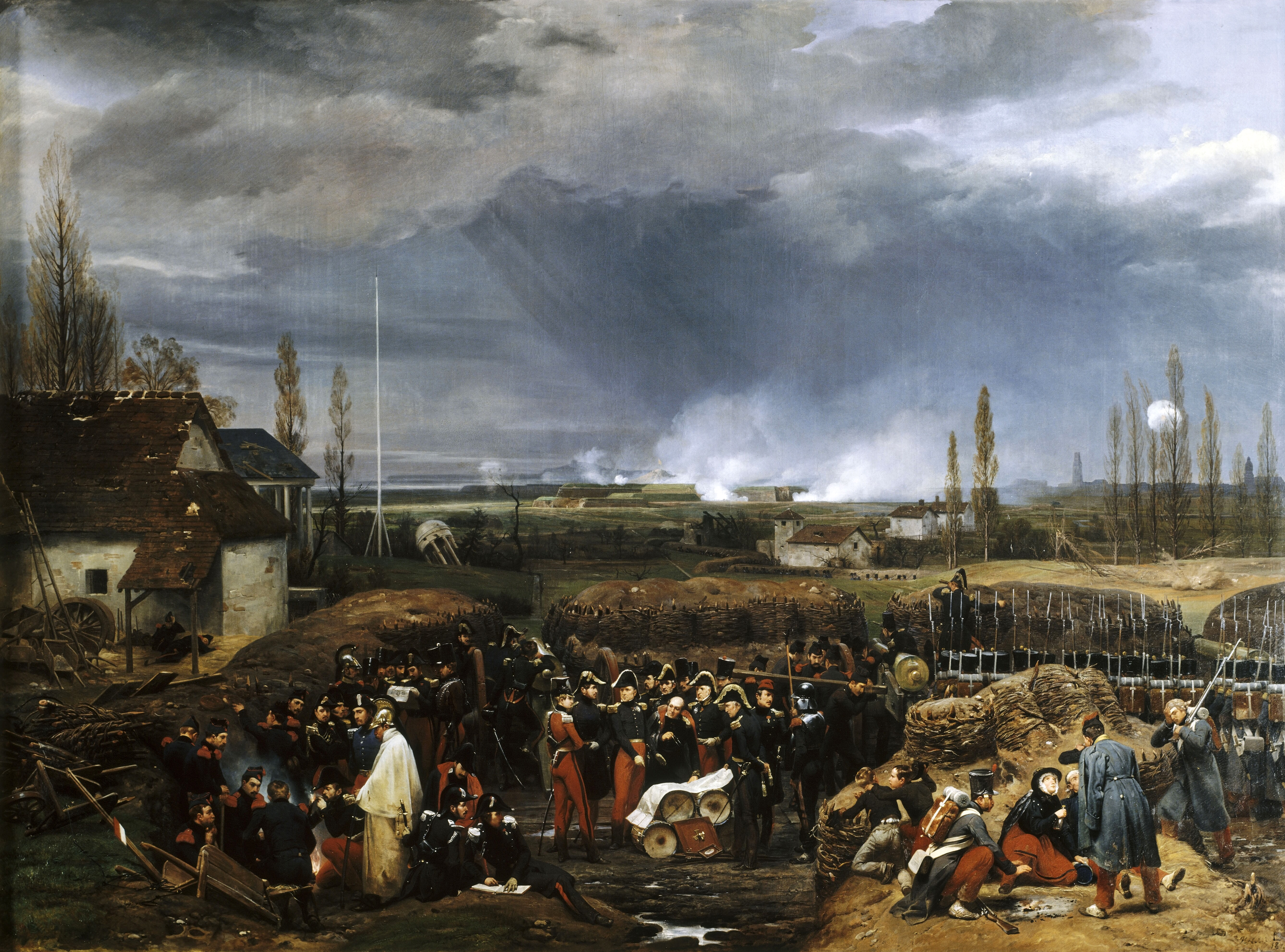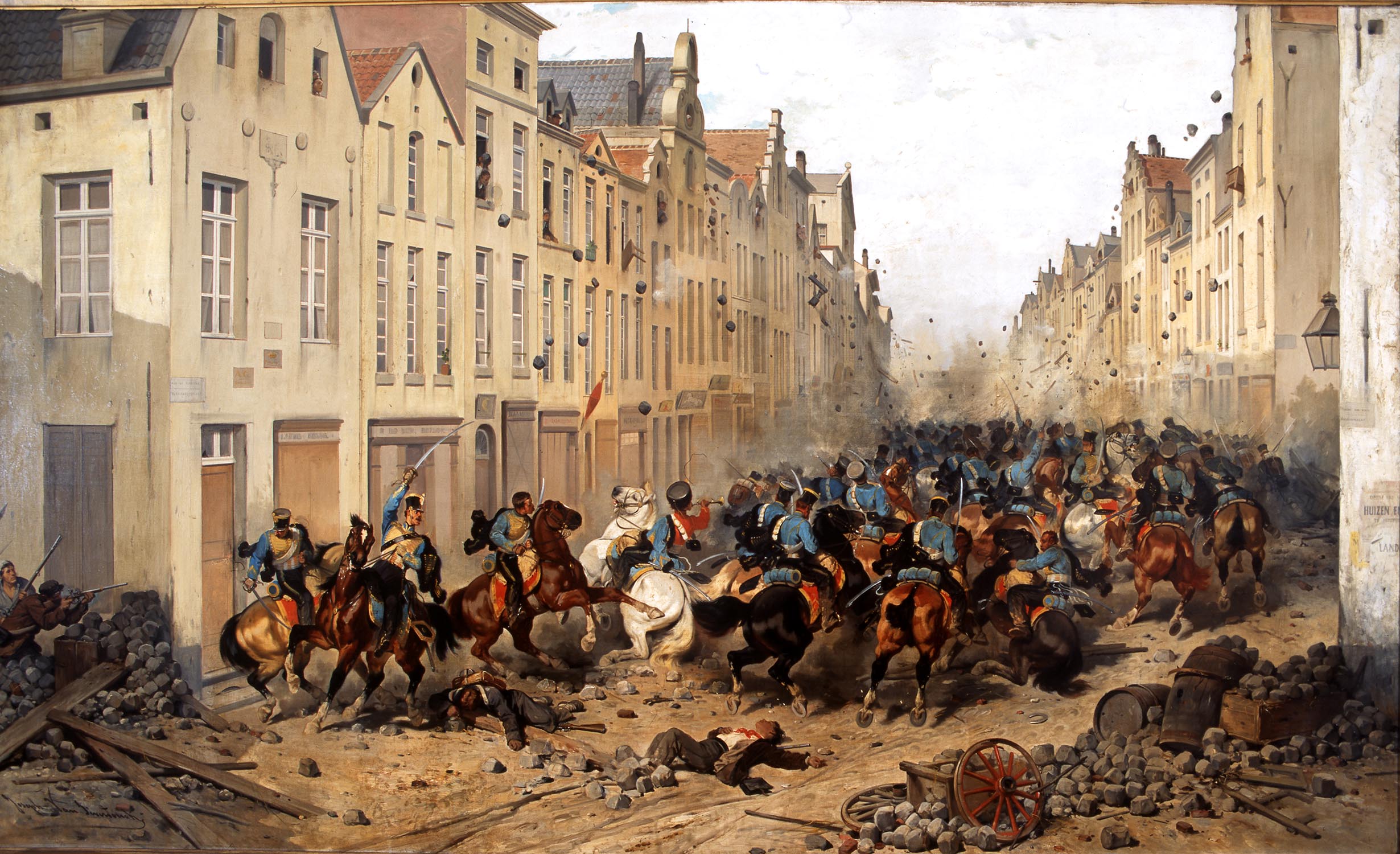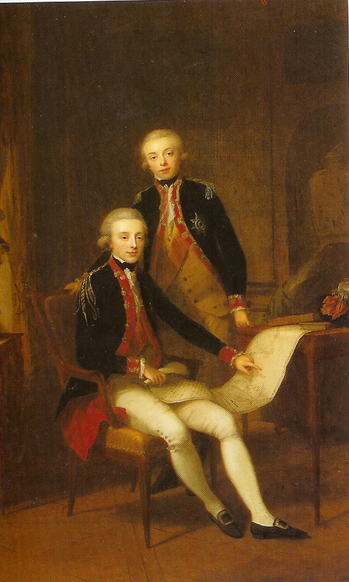|
Érasme-Louis Surlet De Chokier
Érasme-Louis Surlet de Chokier (; 27 November 1769 – 7 August 1839), born in Liège, was a Belgian politician and, before the accession of Leopold I to the Belgian throne, was the first regent of Belgium. During the Liège Revolution of 1789, when a crowd followed the example of the French Revolution and drove off Prince-Bishop of Liège César-Constantin-François, Surlet de Chokier served in the patriotic army. When the following year this army was defeated by the Austrians at Hasselt and Zutendaal, Surlet de Chokier was forced to flee to Breda, not being able to return to his estate at Gingelom until 1792. After the French annexation of Liège, Surlet de Chokier became a devoted follower of the French revolution and of Napoleon. In 1800, Surlet de Chokier was elected mayor of Gingelom and member of the départemental council of Meuse-Inférieure. In 1812, he became a member of the French parliament. After the fall of Napoleon, Surlet de Chokier entered the House of Rep ... [...More Info...] [...Related Items...] OR: [Wikipedia] [Google] [Baidu] |
Regent
In a monarchy, a regent () is a person appointed to govern a state because the actual monarch is a minor, absent, incapacitated or unable to discharge their powers and duties, or the throne is vacant and a new monarch has not yet been determined. The rule of a regent or regents is called a regency. A regent or regency council may be formed ''ad hoc'' or in accordance with a constitutional rule. ''Regent'' is sometimes a formal title granted to a monarch's most trusted advisor or personal assistant. If the regent is holding the position due to their being in the line of succession, the compound term '' prince regent'' is often used; if the regent of a minor is their mother, and she is wife or widow of the king, she would be referred to as ''queen regent''. If the formally appointed regent is unavailable or cannot serve on a temporary basis, a may be appointed to fill the gap. In a monarchy, a regent usually governs due to one of these reasons, but may also be elected to ... [...More Info...] [...Related Items...] OR: [Wikipedia] [Google] [Baidu] |
Meuse-Inférieure
Meuse-Inférieure (; ; ; "Lower Meuse") was a department of the French First Republic and French First Empire in present-day Belgium, Netherlands and Germany. It was named after the river Meuse. Its territory corresponded largely with the present-day provinces of Belgian and Dutch Limburg. It was created on 1 October 1795, when the Austrian Netherlands and the Prince-Bishopric of Liège were officially annexed by the French Republic. Before this annexation, its territory was part of the County of Loon, the Austrian Upper Guelders, the Staats-Oppergelre, the County of Horne, the Abbacy of Thorn, Maastricht and part of the Lands of Overmaas. The original medieval Duchy of Limburg were associated with the Lands of Overmaas, lying to their south. The two regions had long been governed together and referred to collectively with both names, but the original Duchy lands were not part of this new entity. The Chef-lieu of the department was Maastricht. The department was subdivide ... [...More Info...] [...Related Items...] OR: [Wikipedia] [Google] [Baidu] |
1839 Deaths
Events January–March * January 2 – The first photograph of the Moon is taken, by French photographer Louis Daguerre. * January 6 – Night of the Big Wind: Ireland is struck by the most damaging cyclone in 300 years. * January 9 – The French Academy of Sciences announces the daguerreotype photography process. * January 19 – The British Aden Expedition captures Aden. * January 20 – Battle of Yungay: Chile defeats the Peru–Bolivian Confederation, leading to the restoration of an independent Peru. * January – The first parallax measurement of the distance to Alpha Centauri is published by Thomas Henderson. * February 11 – The University of Missouri is established, becoming the first public university west of the Mississippi River. * February 24 – William Otis receives a U.S. patent for the steam shovel. * March 5 – Longwood University is founded in Farmville, Virginia. * March 7 – Baltimore City College, the third public high school in the United Stat ... [...More Info...] [...Related Items...] OR: [Wikipedia] [Google] [Baidu] |
1769 Births
Events January–March * February 2 – Pope Clement XIII dies, the night before preparing an order to dissolve the Jesuits.Denis De Lucca, ''Jesuits and Fortifications: The Contribution of the Jesuits to Military Architecture in the Baroque Age'' (BRILL, 2012) pp315-316 * February 17 – The British House of Commons votes not to allow MP John Wilkes to take his seat after he wins a by-election, on the grounds that he was an outlaw when standing. * March 4 – Mozart departs Italy, after the last of his three tours there. * March 16 – Louis Antoine de Bougainville returns to Saint-Malo, following a three-year circumnavigation of the world with the ships '' La Boudeuse'' and '' Étoile'', with the loss of only seven out of 330 men; among the members of the expedition is Jeanne BarĂ©, the first woman known to have circumnavigated the globe. She returns to France some time after Bougainville and his ships. April–June * April 13 – Jam ... [...More Info...] [...Related Items...] OR: [Wikipedia] [Google] [Baidu] |
List Of Belgian Monarchs
This is a list of Monarchy of Belgium, Belgian monarchs from 1831 when the first Belgian king, Leopold I of Belgium, Leopold I, ascended the throne, after Belgium seceded from the United Kingdom of the Netherlands, Kingdom of the Netherlands during the Belgian Revolution of 1830. Under the Constitution of Belgium, Belgian Constitution, the Belgian monarch is styled "King of the Belgians" (, , ) rather than "King of Belgium" in order to reflect the monarchy's Constitutional monarchy, constitutional and Popular monarchy, popular function. Since 1831, there have been seven Kings of the Belgians and two regents. List Timeline ImageSize = width:800 height:auto barincrement:20 PlotArea = top:10 bottom:50 right:130 left:20 AlignBars = late DateFormat=dd/mm/yyyy Period = from:1830 till:2025 TimeAxis = orientation:horizontal ScaleMajor = unit:year increment:10 start:1830 Colors = id:king value:green legend: king id:regent value:blue legend: regent Legend ... [...More Info...] [...Related Items...] OR: [Wikipedia] [Google] [Baidu] |
Swearing-in Of The Kings Of The Belgians
The swearing-in ceremony (; ) occurs when the Belgian heir-apparent or heir-presumptive takes the oath that allows him or her to become Monarchy of Belgium, King or Queen regnant of the Belgians. Article 91 of the Constitution of Belgium, Belgian Constitution outlines this ceremony, which transpires no later then ten days after the death or abdication of the previous monarch, at the Palace of the Nation in Brussels, the seat of the Belgian Federal Parliament, Belgian Parliament. Should the monarch be unable to govern for more than ten days, the same oath is taken by the List of regents, regent appointed by the Chambers. A significant and symbolic act in the Belgian Constitutional monarchy, constitutional monarchy system, the swearing-in of the oath distinguishes itself from the automatic successions of Ancien RĂ©gime, ''Ancien RĂ©gime'' monarchies. It conditions the accession of the sovereign to the throne. By accepting their constitutional mandate, the monarch becomes the Nation ... [...More Info...] [...Related Items...] OR: [Wikipedia] [Google] [Baidu] |
Prince Louis, Duke Of Nemours
Prince Louis of OrlĂ©ans, Duke of Nemours (Louis Charles Philippe RaphaĂ«l d'OrlĂ©ans; 25 October 1814 – 26 June 1896) was the second son of King Louis-Philippe I of France, and his wife Maria Amalia of Naples and Sicily. Life Childhood He was born at the Palais Royal, in Paris. At twelve years of age, he was nominated colonel of the First Regiment of Chasseurs, and in 1830 entered the '' Chambre des Pairs''. As early as 1825, while revolutionaries were still engaged in the Greek War of Independence, attempting to establish a Kingdom of Greece (which transpired with the London Conference of 1832), Louis' name was mentioned as a possible candidate as the first modern King of Greece. In February 1831, five months before revolutionaries succeeded in the Belgian Revolution, which established the Kingdom of Belgium, Louis was nominated to be the first King of the Belgians; international considerations deterred Louis-Philippe from accepting the honour for his son. Prince ... [...More Info...] [...Related Items...] OR: [Wikipedia] [Google] [Baidu] |
Constitution Of Belgium
The Constitution of Belgium (; ; ) dates back to 1831. Since then Belgium has been a parliamentary monarchy that applies the principles of ministerial responsibility for the government policy and the separation of powers. The most recent major change to the constitution was the introduction of the Court of Arbitration of Belgium, Court of Arbitration, whose competencies were expanded by a special law of 2003, to include Title II (Articles 8 to 32), and the Articles 170, 172 and 191 of the Constitution. The Court developed into a constitutional court; in May 2007 it was formally redesignated as the Constitutional Court of Belgium, Constitutional Court. This court has the authority to examine whether a law or a decree is in compliance with Title II and Articles 170, 172 and 191. Historical aspects Origins and adoption The Belgian Constitution of 1831 was created in the aftermath of the secession of Belgium from the United Kingdom of the Netherlands, United Netherlands in the Bel ... [...More Info...] [...Related Items...] OR: [Wikipedia] [Google] [Baidu] |
National Congress Of Belgium
The National Congress (, ) was a temporary legislature, legislative assembly in Belgium, convened in 1830 in the aftermath of the Belgian Revolution. Its purpose was to devise a Constitution of Belgium, national constitution for the new state, whose independence had been proclaimed on 4 October 1830 by the self-declared Provisional Government of Belgium, Provisional Government. History The National Congress was 1830 Belgian general election, elected by approximately 30,000 voters on 3 November 1830 and consisted of 200 members. Its president was Baron Erasme Louis Surlet de Chokier. The assembly chose a constitutional monarchy, constitutional popular monarchy as the form of government for Belgium and chose the son of the July Monarchy, French King Louis-Philippe, Prince Louis, Duke of Nemours, Louis, Duke of Nemours, as the new head of state. Other candidates included Auguste de Beauharnais, 2nd Duke of Leuchtenberg, Auguste de Beauharnais and Archduke Charles, Duke of Teschen, ... [...More Info...] [...Related Items...] OR: [Wikipedia] [Google] [Baidu] |
Arrondissement Of Hasselt
The Arrondissement of Hasselt (; ) is one of the three administrative arrondissements in the Province of Limburg, Belgium. It is both an administrative and a judicial arrondissement. However, the Judicial Arrondissement of Hasselt also comprises the municipalities of Lommel, Hamont-Achel, Neerpelt, Overpelt, Hechtel-Eksel, Peer and Houthalen-Helchteren in the Arrondissement of Maaseik. Municipalities The Administrative Arrondissement of Hasselt consists of the following municipalities: * As * Beringen * Diepenbeek * Genk * Gingelom * Halen * Hasselt * Herk-de-Stad * Heusden-Zolder * Leopoldsburg * Lummen * Nieuwerkerken * Sint-Truiden * Tessenderlo-Ham * Zonhoven * Zutendaal Per 1 January 2019, the municipality of Opglabbeek was removed from this arrondissement, as it was merged with Meeuwen-Gruitrode into the new municipality of Oudsbergen in the arrondissement of Maaseik. References Hasselt Hasselt (, , ) is the capital and largest City status ... [...More Info...] [...Related Items...] OR: [Wikipedia] [Google] [Baidu] |
Belgian Revolution
The Belgian Revolution (, ) was a conflict which led to the secession of the southern provinces (mainly the former Southern Netherlands) from the United Kingdom of the Netherlands and the establishment of an independent Kingdom of Belgium. The people of the south were mainly Flemish people, Flemings and Walloons. Both peoples were traditionally Roman Catholic as contrasted with Protestant-dominated (Dutch Reformed) people of the north. Many outspoken liberals regarded William I of the Netherlands, King William I's rule as despotic. There were high levels of unemployment and industrial unrest among the working classes. On 25 August 1830, riots erupted in Brussels and shops were looted. Theatergoers who had just watched the nationalistic opera ''La muette de Portici'' joined the mob. Uprisings followed elsewhere in the country. Factories were occupied and machinery destroyed. Order was restored briefly after William committed troops to the Southern Provinces but rioting continued ... [...More Info...] [...Related Items...] OR: [Wikipedia] [Google] [Baidu] |
William I Of The Netherlands
William I (Willem Frederik; 24 August 1772 – 12 December 1843) was King of the Netherlands and List of monarchs of Luxembourg, Grand Duke of Luxembourg from 1815 until his abdication in 1840. Born as the son of William V, Prince of Orange, the last stadtholder of the Dutch Republic, and Wilhelmina of Prussia, Princess of Orange, Wilhelmina of Prussia, William experienced significant political upheavals early in life. He fought against the French invasion during the Low Countries theatre of the War of the First Coalition, Flanders campaign, and after the Batavian Revolution in 1795, his family went into exile. He briefly ruled the Principality of Nassau-Orange-Fulda before Napoleon's French troops' occupation forced him out of power. Following the defeat of Napoleon in 1814, William was invited back to the Netherlands, where he proclaimed himself Sovereign Prince of the United Netherlands. In 1815, William raised the Netherlands to a kingdom and concurrently became the gran ... [...More Info...] [...Related Items...] OR: [Wikipedia] [Google] [Baidu] |








